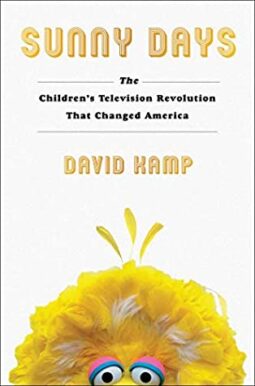This review contains affiliate links, which earn me a small commission when you click and purchase, at no extra cost to you. Thank you for supporting my small business and allowing me to continue providing you a reliable resource for clean book ratings.
For readers who, like me, were children in the ‘70s, Sunny Days is a delightful opportunity to revisit some halcyon hours spent … in front of the television. Today, we’re bemoaning how much screen time young people are racking up, thanks to streaming services and mobile devices, but four and five decades ago, just one screen was the interloper in homes, and it wasn’t 70 inches, UHD, 4K, or smart; some homes still had yet to upgrade from black and white to color. But the programming available on three major networks was sometimes decried as “a vast wasteland,” and plenty wondered if it was damaging impressionable young minds.
So a number of individuals and groups independently decided to create programming for children that would help them learn and speak to them on their level. David Kamp explores how varying factors came together in a “unique political and social moment” that was the perfect incubator for beloved programs such as “Mister Rogers’ Neighborhood,” “Sesame Street,” “The Electric Company,” and “Schoolhouse Rock.”
Thanks to many hours of interviews with people involved in these efforts, Kamp brings to life this era and the optimism of those who hoped to use this fairly new medium to do good in children’s lives. The people who created “Sesame Street” and, later, “The Electric Company” aimed to level the educational playing field, knowing that many disadvantaged children were starting public school already behind their more privileged peers. They did extensive research as they designed the set, filled it with human and Muppet characters (it’s fun to learn a bit about Jim Henson and what he was doing in those early days of his career), and figured out what format it should take, patterning it short skit-style after “Laugh-in.” (Who knew?)
Fred Rogers’ story is probably more familiar now, thanks to recent documentaries and a Tom Hanks film about him. He wanted to reach out and help children feel cared about and able to explore, talk about and manage their emotions. Famously, his plea to a Senate committee about this goal kept the Corporation for Public Broadcasting’s budget from getting cut in half.
Marlo Thomas’ “Free to Be” was a “gender-politics primer” (oddly enough, even though I vividly recall almost all of the programs mentioned in Sunny Days, this is one I do not remember at all); “Fat Albert” was a fun program Bill Cosby (yep…) envisioned to help teach kids about “morality and decency” (yep…) and was “notable for being, like ‘Sesame Street,’ a TV show where African American children could recognize a version of themselves on screen.”
Overall, Sunny Days is educational and entertaining for us now-middle-aged kids of the 1970s, much like the television shows it talks about. I can only say “Bravo!” to the big-hearted trailblazers who made such a difference in the lives of millions of young people at a crucial time in their development.
Rated: Moderate, for language. There are two instances of strong language, one use of moderate profanity, and five uses of mild language. There are a couple of mildly off-color references.
*I received an ARC of this book in exchange for my honest review.
Click here to purchase your copy of Sunny Days on Amazon.




